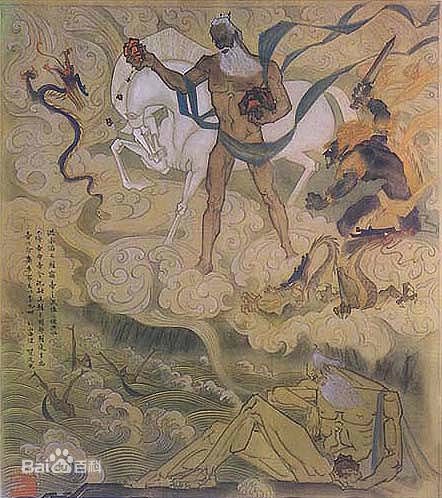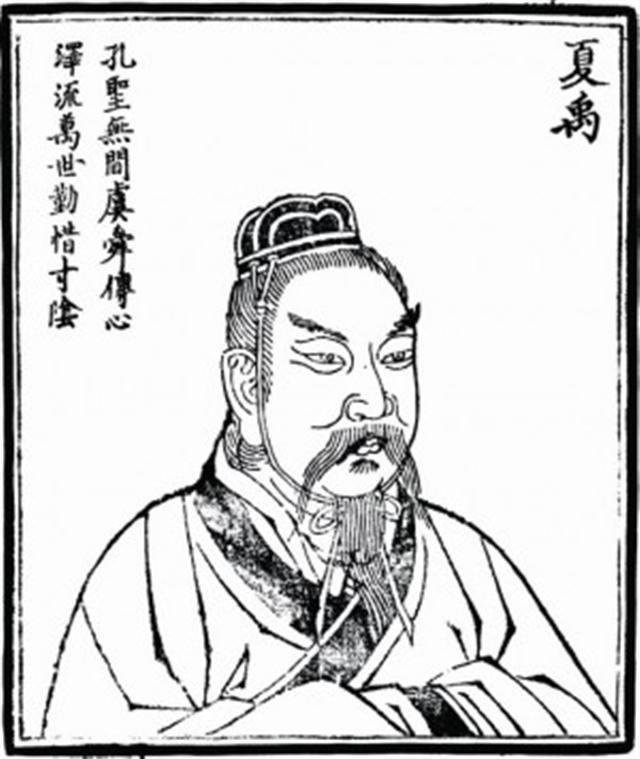Myths and Legends
(5) Battles between Flood and Landscape
 When the universe began, people all over the world experienced floods. The ancient Chinese believed that the Supreme God Tien Di flooded the earth to punish people because they did not respect him enough.
When the universe began, people all over the world experienced floods. The ancient Chinese believed that the Supreme God Tien Di flooded the earth to punish people because they did not respect him enough.
A drama began among the gods. One god did everything he could to end the flood. Other gods tried to work against him. The battles lasted a long time. In the end, the hero god who loved people won. He was Gun, the grandson of Tien Di.
Gun (鯀) was seen as a white horse with wings. He was fond of flying across the sky to survey how people lived. When he saw the misery of people in the flood, he wanted to help. He had the help of Owl and Tortoise, both miner gods.
“All we need is a lump of Xirang(息壤), the magic soil.” Owl said, always suggesting practical plans for Gun.
Gun was very excited. He asked: “What can this magic soil do? I will get it even if I had to brave swords and fire.”
“It swells to an enormous size when it touches water to become rocks and solid land. But it is now locked inside a volt in the Palace of Tien Di, guarded by a pair of ferocious beasts day and night.”
Gun disappeared as soon as Owl had finished. He stole a small bag of the magic soil using his godly wit. He knew the guarding beasts were fond of eating tiger meat. He engaged a tiger to lure them away so he could reach the volt.
The battle with the flood began immediately. Owl was an excellent landscape planner. He put the magic soil on the back of Tortoise and asked him to swim, slowly or as fast as he could, according to plan. Then Owl and Gun flew high and low, giving Tortoise directions.
They first had the magic soil swell and expanded to make two tall mountains. They formed a huge river to guide the flood into the sea. On the other side of one mountain, Tortoise swam criss-cross in speed. Behind him a huge plain was formed. The three gods had so much fun that they went on doing the magic show to build a beautiful landscape for China. There were mountains and valleys, rivers and streams, and flat plains to grow grain and grass.
People soon returned. They cultivated food and reared cattle. They planted fruit trees and nurtured flowers. Soon, life became rich and happy. People sang and danced to thank Gun for his benevolent work in creating such a magnificent country on earth. Their loud laughter reached Tien Di in heaven. He was infuriated. He became more incensed when he found out that it was his own grandson who had stolen the Xirang and transformed the earth into a joyous and thriving land.
“This must stop!” shouted Tien Di as he dispatched the Water God and the Fire God to earth to spoil the thriving condition and to get rid of Gun.
The wise Owl got the information and sent people to stay on high grounds. He also helped Tortoise to build dykes so water would be saved for irrigation.
The cunning Fire God took advantage of Gun’s kindness and love for mankind. He told him that if he was willing to die, Tien Di would forgive him and allow the earth to thrive. Otherwise, there would be more floods.
Gun agreed to die. He went to a cave up near the top of the highest mountain and suffocated himself until he breathed no more.
 Tien Di was not satisfied. He was afraid that people would remember Gun and worship him generation after generation. He sent another god to cut Gun’s body into pieces and spread them into the swift currents of rivers and streams.
Tien Di was not satisfied. He was afraid that people would remember Gun and worship him generation after generation. He sent another god to cut Gun’s body into pieces and spread them into the swift currents of rivers and streams.
But, Gun’s spirit lived. A drop of his blood flowed in a stream. A peasant woman drank it. She became pregnant. Ten months later, a baby was born in a hut above which a dragon circled round and round for three nights. The baby was named Yu (禹). He grew up to become an expert on water works. He worked so hard to build up such a good water system for China that he was made an Emperor in the Xia(夏)Dynasty.
He was remembered as the Great Yu and Father of Irrigation. Because of the legendary story of his birth, the Chinese people have been proud to call themselves “descendants of the dragon” (龍的傳人) ever since.
Note: This is a narration of a passage in the book 《山海經》 recording the imagination of ancient Chinese on the early days of the universe. There are a number of similar stories depicting the battles between god and man. I have constructed this tale to reflect the basic spirit of our ancient tales, and to describe the events in more reasonable and acceptable manners for modern readers.

